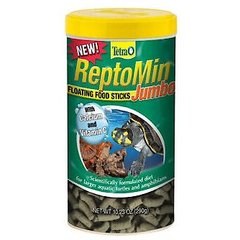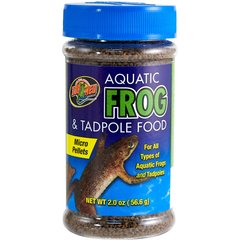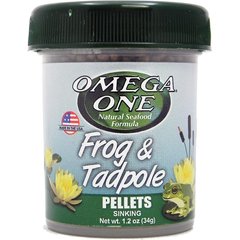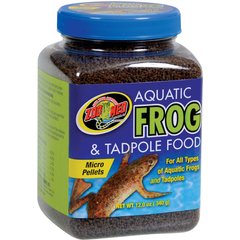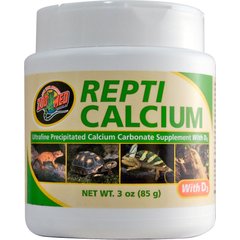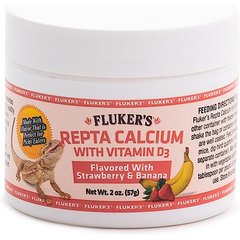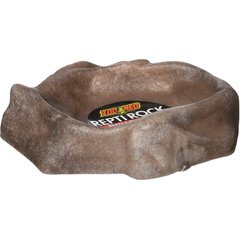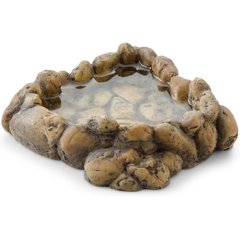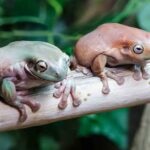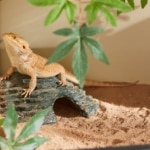What Do Frogs Eat? A Guide to Feeding Amphibians

Photo by wildacad/Getty
Important note: Most of the information in this article applies to both terrestrial frogs (frogs who live on land, like leopard frogs and tree frogs) and aquatic frogs (frogs who live in water, like African dwarf frogs). However, these two types of frogs have plenty of differences, and their needs vary by species as well. The best way to plan a diet for your unique frog is to discuss it with your veterinarian.
What Do Frogs Eat?
In general, a frog’s diet is determined by their natural environment as well as their size. Just like with us, their nutritional needs will change throughout their life based on growth and metabolism. Some foods that frogs eat can include the following:
Insects
Terrestrial frogs eat a variety of insects. The nutritional value of insects will be improved by gut loading, which is feeding the insects a high nutrient content feed for one to three days prior to offering them to your frog. Types of insects can include:
- Fly larvae
- Caterpillars
- Grasshoppers
- Crickets
- Dragonflies
- Mealworms
- Phoenix worms
- Waxworms (in limited quantities, since they’re high in fat and can cause intestinal blockages)
Insects should be dusted with calcium and multivitamin powders when fed in captivity to increase their nutritional benefit. (More on that below.)
Recommended Products
Marine Food Sources
Aquatic frogs’ diets are, naturally, made of creatures who live in the water. In captivity, aquatic frogs are fed things like:
- Bloodworms
- Brine shrimp
- Commercially made frog pellets containing fish meal and other marine ingredients
Earthworms
Frogs, both terrestrial and aquatic, also enjoy earthworms—in fact, in addition to insects, they often eat earthworms in the wild. But they’ll need some added nutritional value when in captivity. Like insects, earthworms must be dusted with calcium and multivitamin powders when fed in captivity. (We’re going into more detail about calcium supplementation below.)
Small Prey Items
Large frogs may eat other small, live prey items in the wild, like small lizards, fish or even smaller frogs. This is because adult frogs are carnivorous and rely on a diet high in protein. At home, small fish can be an option—just be sure to discuss your frog’s nutritional plan with your veterinarian first.
For most frogs in captivity, the key to a balanced, varied diet is a mix of gut-loaded, calcium-dusted insects. The biggest thing to remember is that the nutritional needs of your frog will vary based on species. Make sure to research your individual species to ensure you are offering the appropriately sized prey. You should also talk this over with your vet.
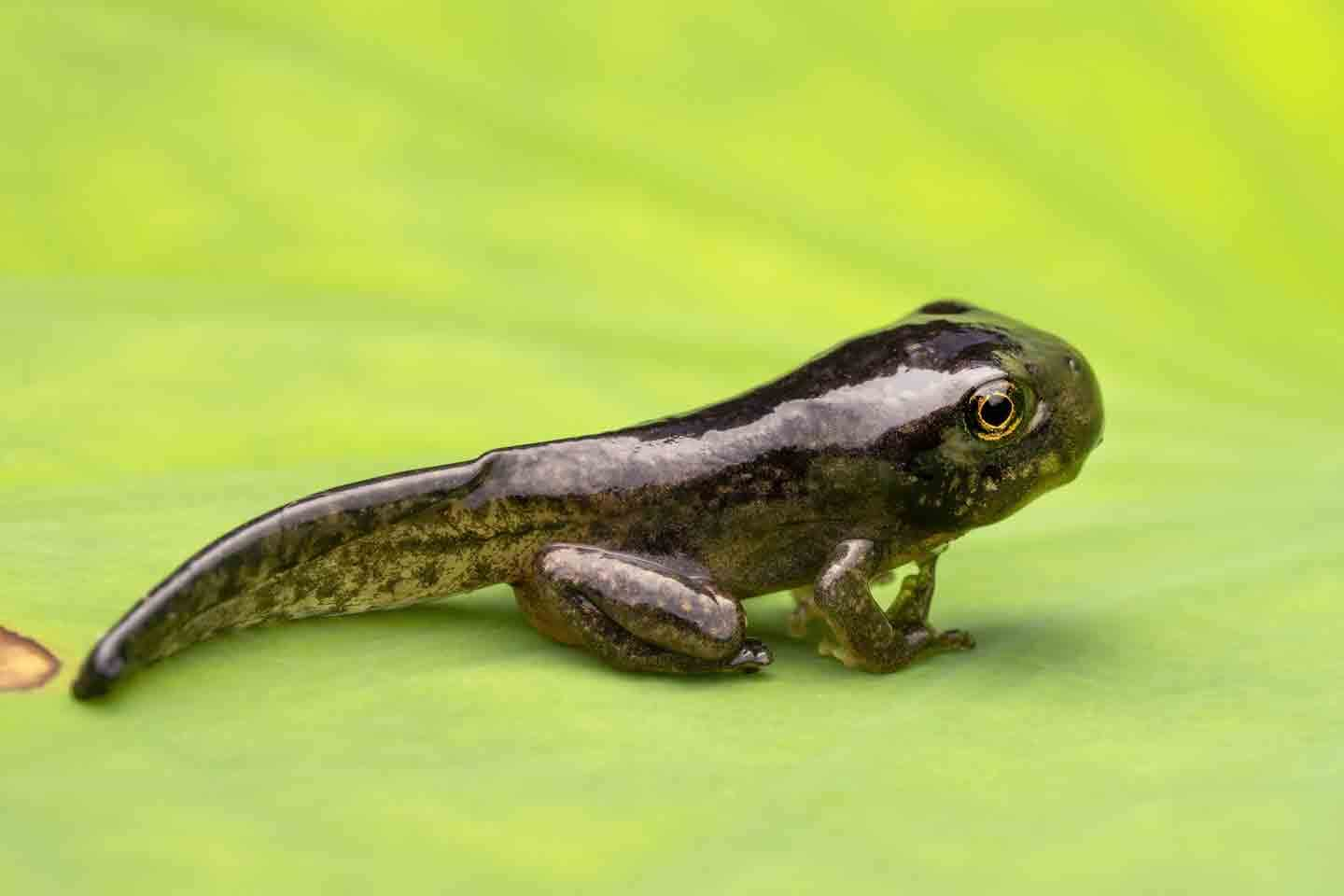
Mark Kostich/Getty
Best Foods for Baby Frogs
Baby frogs, also known as tadpoles, have different anatomy from older frogs, including adaptations for a fully aquatic environment. They can’t breathe air and must stay in the water, where they typically eat herbivorous plant matter, like aquatic plant or algae material. However, certain tadpoles are also carnivores, and will eat small crustaceans or insect larvae in the water.
For most species, veterinarians recommend feeding tadpoles a commercially available, plant-based pelleted food source made for tadpoles or fish. It’s also advised to supplement the tadpoles’ diet with small amounts of fresh romaine lettuce or broccoli florets, and afterwards, remove any uneaten food to keep the water clean.
For newly metamorphosed froglets, aka small frogs who have lost their tails and now live on land, small insects such as fruit flies or black soldier fly larvae work best.
Recommended Products
Calcium Supplementation
All frogs will need the nutritional value of their food increased through calcium and multivitamin powders that are dusted onto their food. Most frogs should eat insects dusted with calcium powder, and some frogs may also need vitamin D3 supplements, which can help their bodies utilize the calcium supplementation. This can be accomplished with a calcium powder with added vitamin D3.
Recommended Products
Many vets also recommend gut loading, which is the process of feeding insects a balanced diet of vitamin-rich vegetable matter before feeding them to frogs so they provide a better nutrient profile when consumed. This can be achieved by allowing feeder insects to eat a balanced commercial diet in addition to kitchen vegetable scraps for several days before they are fed to frogs.
Vets also suggest dusting feeder insects with a multivitamin supplement once weekly to ensure pet frogs receive enough vitamin A in their diet.
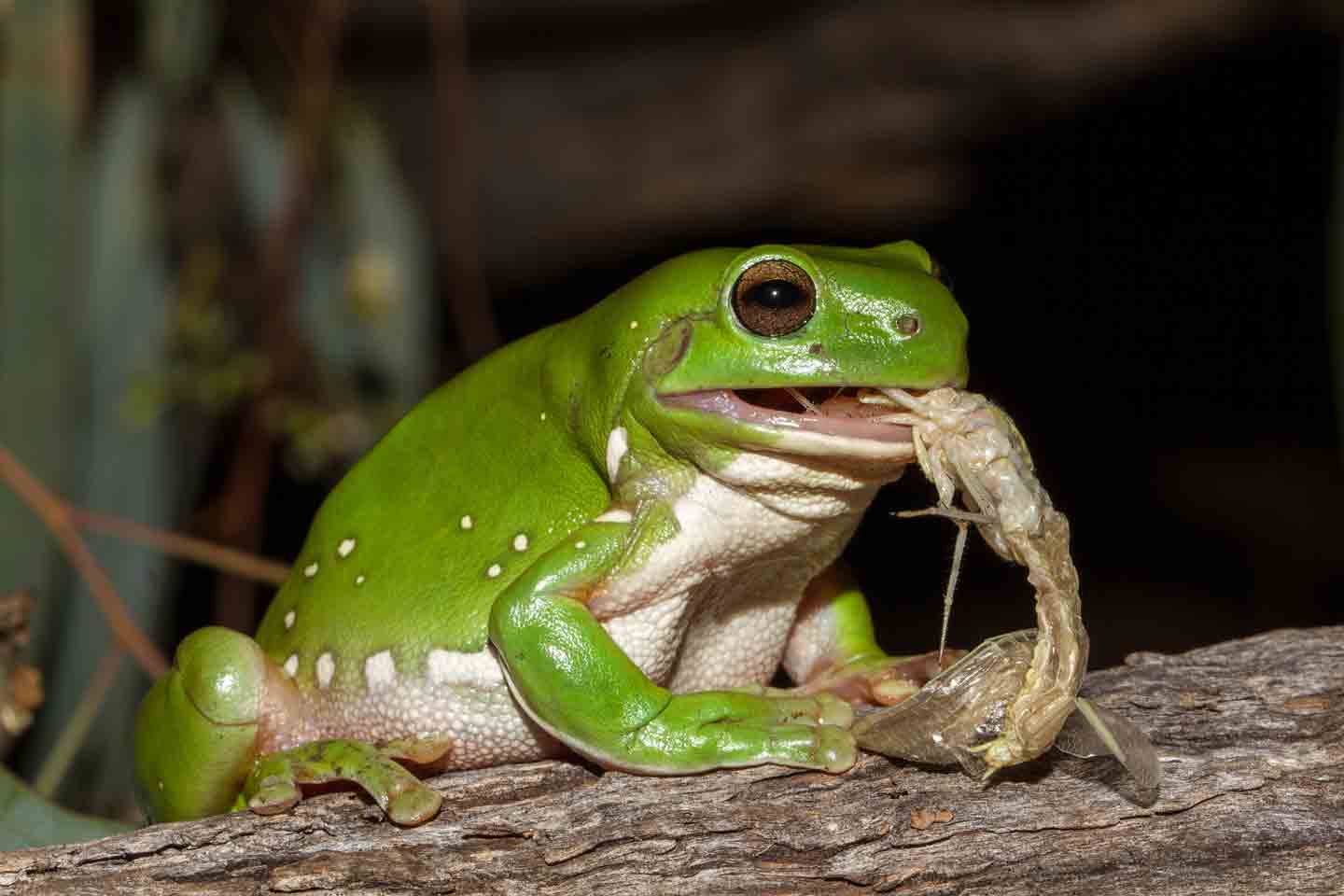
Ken Griffiths/Getty
Pet Frog Feeding Tips
There are several tips to take into account when feeding a frog. Keep in mind that depending on the size and species of frog, there are many appropriate ways to feed.
Where to Feed Your Frog
Consistently feed your frog in the same area. Some species, especially larger frogs who burrow like Pacman frogs, can be placed into a separate feeding container with their insects to allow them to eat. Other frogs can be fed directly in their enclosure. Talk to your vet about the best feeding area for your species.
How to Feed Your Frog
Depending on your frog’s species and individual preferences, there are several ways to feed them:
- Place your frog’s food in a flat, shallow dish. This works for most frog species.
- Smaller species, like Dart frogs, do best when their insects are simply released into their enclosure. This allows them to hunt and feed using their sticky tongue as naturally as possible.
- Some frogs readily accept insects one at a time when offered by hand or with feeding tongs, but care must be taken to avoid the frog injuring itself if it accidentally bites the feeding tongs. To err on the side of caution, only use tongs that are specifically designed for feeding insects to amphibians, and approach your frog very slowly and gently with the tongs.
How Much Should I Feed My Frog?
Generally, young frogs should be fed daily at night, while adults need to eat two to three times weekly. But be aware that the frequency and amount of feeding always depends on the age and species. For instance, some species of frogs are nocturnal and prefer to feed at night, but many adapt to daytime feedings in captivity.
Now let’s talk about portion size. Feed as much as your frog can eat in 10-15 minutes, which can help prevent ingestion of substrate while eating.
Pro Tip: Frogs should never be fed items bigger than the space between their eyes.
Know that frogs are prone to obesity and will overeat if allowed, which can lead to gastric impaction. To avoid overfeeding, talk to your vet about how much your frog should weigh and how much food they need to maintain a healthy weight.
Bring your frog to an exotics veterinarian regularly to keep an eye on their weight, body condition and overall health.
Do Frogs Drink Water?
All frogs need to have fresh water available at all times. This water can be provided via an accessible water dish; high humidity; or elaborate recirculating systems with waterfalls, which can create a moist environment. The water must be chlorine and chloramine free. Some frogs appreciate misting tank surfaces as well.
Any water added to their tank should be bottled spring or deionized drinking water. Tap water can be used in small amounts only if it has first been dechlorinated with a commercial water conditioner.
Recommended Products
What Not to Feed Your Frog
- Fireflies: These are toxic to frogs and other pets who eat insects.
- Wild-caught insects: Frogs should not eat insects or worms brought in from outside, as they may contain parasites, traces of outdoor pesticides or insect bait that can be toxic to frogs.
Frequently Asked Questions About Feeding Frogs
Can frogs eat lettuce?
No, but tadpoles can! Tadpoles have specifically adapted mouthparts and GI tract anatomy designed to feed on decaying plants and algae, which is similar to lettuce, during the aquatic part of their life cycle. Adult frogs are adapted to eat insects and not plant material during their air-breathing life stage.
Do frogs eat mice?
Certain large frogs (like Pac Man frogs, African Bullfrogs and others) will eat small mice or other small mammals if offered. However, mice are high in fat and don’t provide a good nutritional profile, so these should only be offered sparingly.
Why do frogs eat flies?
Frogs eat flies because they are adapted to eat insect prey—they are insectivores—and flies are insects.
There are many frog species that can be kept as pets, and all of them have unique housing and dietary requirements. That’s why it’s so important to bring your pet frog to an exotics veterinarian regularly for health assessments and species-specific care advice. Need more frog care advice? Check out our full guide to Frogs 101.
Expert input for this story provided by Dr. Sherri Edgar, DVM, owner veterinarian at CityVet Las Colinas in Irving, Texas; and Dr. Ashton Boon, DVM, veterinarian at Avian and Exotic Animal Care in Raleigh, North Carolina.
